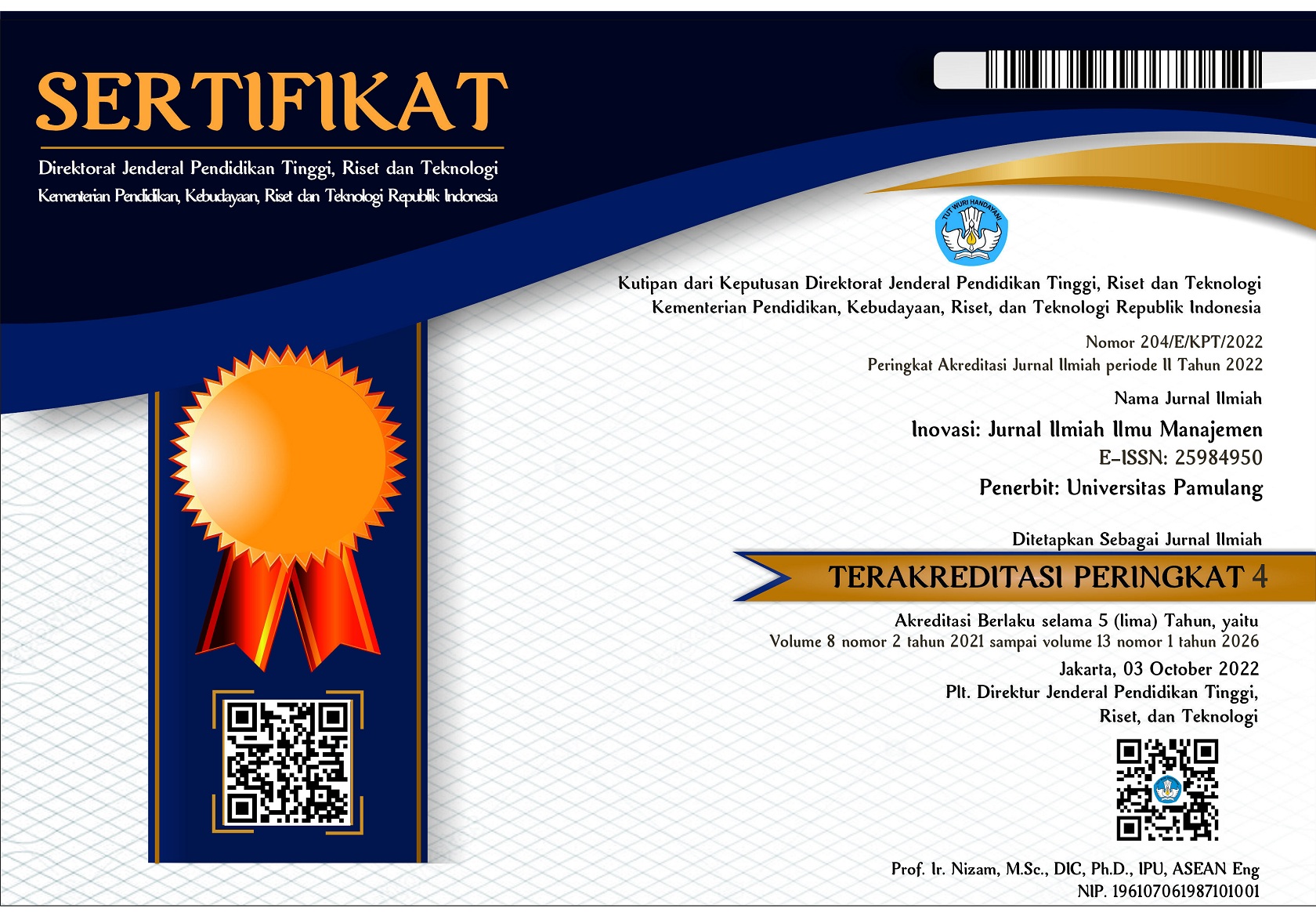PENGARUH GAYA KEPEMIMPINAN DAN KEPUASAN KERJA TERHADAP TURNOVER INTENTION KARYAWAN PT. GARUDA KARYA MANDIRI
DOI:
https://doi.org/10.32493/Inovasi.v4i1.p%25p.552Abstract
ABSTRAK
PENGARUH GAYA KEPEMIMPINAN DAN KEPUASAN KERJA TERHADAP TURNOVER INTENTION KARYAWAN PT. GARUDA KARYA MANDIRI. Penelitian ini bertujuan untuk mengetahui pengaruh gaya kepemimpinan dan kepuasan kerja secara parsial maupun simultan terhadap turnover intention karyawan. Penelitian ini menggunakan metode deskriptif kuantitatif, dengan variabel X1 Gaya Kepemimpinan, variabel X2 Kepuasan Kerja, variabel Y Turnover Intention karyawan. Data yang digunakan dalam penelitian merupakan data primer yang diperoleh langsung melalui survey menggunakan quisioner kepada karyawan PT. Garuda Karya Mandiri, sampel yang diambil adalah 50 responden untuk setiap variabel. Hasil uji hipotesis secara parsial menunjukkan bahwa hasil thitung dari uji pengaruh variabel gaya kepemimpinan nilainya lebih besar dari ttabel, sedangkan untuk variable kepuasan kerja, nilai thitung lebih kecil dari nilai ttabel. Secara simultan diperoleh nilai Fhitung lebih besar dari Ftabel. Persamaan Regresi Linier Berganda yang dihasilkan dari penelitian ini Y = - 0.034 + 0.324X1 +0.016X2. Berdasarkan hasil penelitian tersebut dapat disimpulkan bahwa gaya kepemimpinan berpengaruh signifikan terhadap Turnover Intention karyawan sedangkan kepuasan kerja tidak berpengaruh terhadap turnover Intention karyawan, secara simultan gaya kepemimpinan dan kepuasan kerja berpengaruh signifikan terhadap Turnover Intention karyawan.
Kata Kunci :Gaya Kepemimpinan, Kepuasan Kerja, Turnover Intention Karyawan
ABSTRACT
EFFECT OF STYLES OF LEADERSHIP AND SATISFACTION WORK ON TURNOVER INTENTION EMPLOYEES PT. GARUDA KARYA MANDIRI. This study aims to determine the influence of leadership style and job satisfaction partially or simultaneously to employee turnover intention. This research uses quantitative descriptive method, with variable X1 Leadership Style, X2 Job Satisfaction, Y Turnover Intention employees. The data used in the study is the primary data obtained directly through the survey using quisioners to employees of PT. Garuda Karya Mandiri, the sample taken is 50 respondents for each variable. The result of hypothesis test partially shows that the result of tcount of influence test of leadership style variable is bigger than ttable, while for job satisfaction variable, tcount value is smaller than ttable value. Simultaneously, the value of Fcount is greater than Ftable. The Multiple Linear Regression Equation resulting from this research Y = - 0.034 + 0.324X1 + 0.016X2. Based on the result of this research, it can be concluded that leadership style has significant effect to Turnover Intention of employees while job satisfaction has no effect to employee intention turnover, simultaneously leadership style and job satisfaction have significant influence to Turnover Intention of employees.
Keywords: Leadership Style, Job Satisfaction, Employee Turnover Intention
Downloads
Published
How to Cite
Issue
Section
License
Authors who publish with this journal agree to the following terms:
- Authors retain copyright and grant the journal right of first publication with the work simultaneously licensed under a Creative Commons Attribution License that allows others to share the work with an acknowledgement of the work's authorship and initial publication in this journal.
- Authors are able to enter into separate, additional contractual arrangements for the non-exclusive distribution of the journal's published version of the work (e.g., post it to an institutional repository or publish it in a book), with an acknowledgement of its initial publication in this journal.
- Authors are permitted and encouraged to post their work online (e.g., in institutional repositories or on their website) prior to and during the submission process, as it can lead to productive exchanges, as well as earlier and greater citation of published work (See The Effect of Open Access).
INOVASI: journal of managenet have CC-BY-SA or an equivalent license as the optimal license for the publication, distribution, use, and reuse of scholarly work.
In developing strategy and setting priorities, INOVASI: JOURNAL OF MANAGEMENT recognize that free access is better than priced access, libre access is better than free access, and libre under CC-BY-SA or the equivalent is better than libre under more restrictive open licenses. We should achieve what we can when we can. We should not delay achieving free in order to achieve libre, and we should not stop with free when we can achieve libre.









